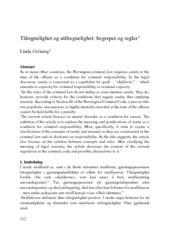Tilregnelighet og utilregnelighet : begreper og regler
Journal article, Peer reviewed
Published version

Åpne
Permanent lenke
https://hdl.handle.net/1956/20886Utgivelsesdato
2015-05-25Metadata
Vis full innførselSamlinger
- Faculty of Law [2479]
Sammendrag
As in many other countries, the Norwegian criminal law requires sanity at the time of the offense as a condition for criminal responsibility. In the legal discourse, sanity is conceived as a capability for guilt – “skyldevne” – which amounts to capacity for criminal responsibility or criminal capacity. Yet the rules of the criminal law do not define or even mention sanity. They do, however, provide criteria for the conditions that negate sanity, thus implying insanity. According to Section 44 of the Norwegian Criminal Code, a person who was psychotic, unconscious or highly mentally retarded at the time of the offense cannot be held liable for a penalty. The current article focuses on mental disorder as a condition for excuse. The ambition of the article is to explain the meaning and justifications of sanity as a condition for criminal responsibility. More specifically, it aims to create a clarification of the concepts of sanity and insanity as they are constructed in the criminal law and its doctrines on responsibility. As the title suggests, the article also focuses on the relation between concepts and rules. After clarifying the meaning of legal insanity, the article discusses the content of the current regulation in the criminal code and possible alternatives to it.
